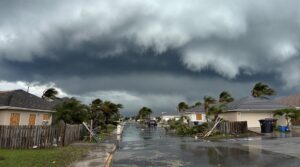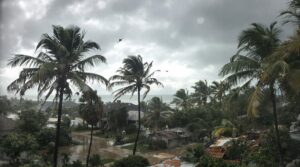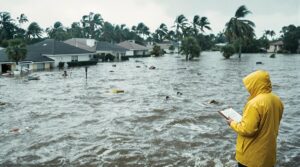Homeowners insurance provides partial coverage for hurricane damage, primarily protecting against wind-related destruction. Standard policies typically cover structural repairs from high winds, interior damage from wind-driven rain, and additional living expenses during repairs. However, flood damage requires separate insurance coverage through NFIP or private insurers. Hurricane deductibles differ from standard deductibles, calculated as 1-5% of the home's insured value. Understanding the specific terms and limitations of hurricane coverage reveals vital details for extensive protection.
Key Takeaways
- Standard homeowners insurance covers hurricane wind damage, including repairs to roofs and structural components damaged by high winds.
- Hurricane deductibles are higher than standard deductibles, typically 1-5% of your home's insured value.
- Flood damage from hurricanes requires separate flood insurance, as standard homeowners policies don't cover flooding.
- Interior damage from wind-driven rain is usually covered if storm creates openings in walls or roof.
- Additional Living Expenses coverage helps pay for temporary housing and living costs while hurricane damage is repaired.
Understanding Hurricane Coverage Basics
Most homeowners insurance policies provide specific coverage for hurricane-related damage, though the extent and limitations vary considerably. Standard policies typically cover wind damage, including repairs to exterior components like roof shingles and structural elements.
When wind-driven rain enters through hurricane-damaged openings, resulting interior damage is generally covered as well. Having experienced staff available can help guide homeowners through the complexities of filing hurricane damage claims.
A critical aspect of hurricane preparedness tips involves understanding policy deductibles, which often differ for hurricane events. These specialized deductibles are calculated as a percentage of the home's insured value rather than a fixed amount. Public adjusters can help property owners ensure they receive fair claim compensation for hurricane damages.
Insurance policy reviews are vital to comprehend coverage limitations and guarantee adequate protection. Policies may include provisions for temporary living expenses if the home becomes uninhabitable due to hurricane damage.
However, it is essential to recognize that standard policies exclude flood damage, necessitating separate flood insurance coverage. Understanding these fundamental aspects helps homeowners assess their coverage needs effectively.
The Scope of Wind Damage Protection
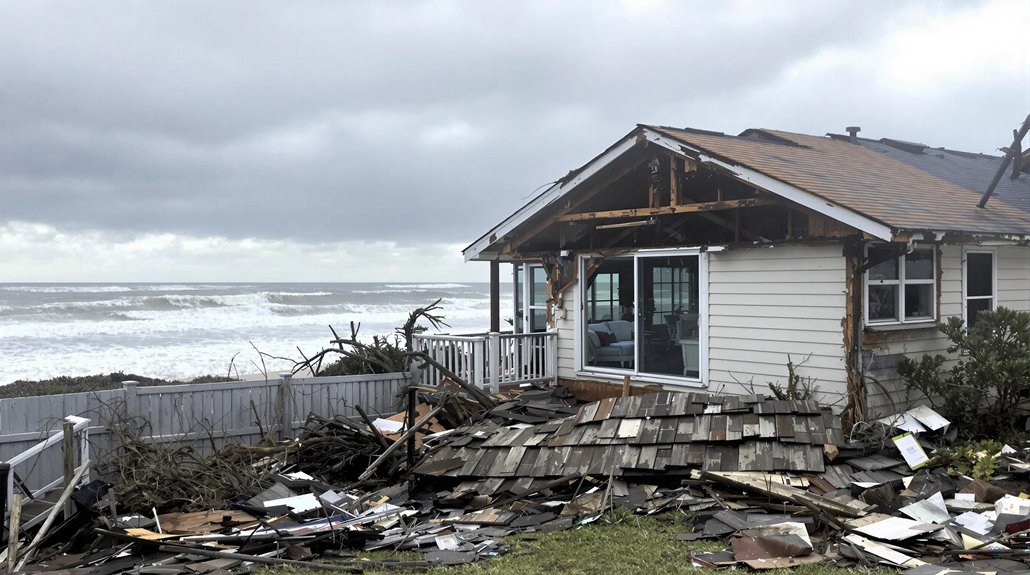
Building upon the fundamentals of hurricane coverage, understanding the specific scope of wind damage protection provides homeowners with clear parameters for their insurance coverage.
Standard homeowners insurance policies typically include windstorm coverage for various types of events, from hurricanes and tornadoes to thunderstorms and derechos. Standard policy limitations may affect the total amount of compensation available for wind-related claims.
The protection extends to both structural damage and personal property losses caused by high winds. However, deductible variations play an important role in determining out-of-pocket expenses. Named storm events often trigger separate, percentage-based deductibles that differ from standard policy deductibles. Additional living expenses may be covered if hurricane damage renders a home temporarily uninhabitable.
Geographic location greatly influences coverage requirements, with coastal properties frequently requiring supplemental wind insurance policies for thorough protection.
While standard policies cover wind-related damage, they exclude flood damage, which requires separate coverage through the National Flood Insurance Program or private insurers.
Coverage limits and state-specific regulations further define the extent of wind damage protection available to homeowners.
Navigating Hurricane Deductibles

Understanding hurricane deductibles is essential for homeowners in coastal regions, as these specialized charges differ markedly from standard insurance deductibles. These deductibles, required in 19 states and the District of Columbia, typically activate when the National Weather Service designates a storm as a hurricane.
Different hurricane deductible types exist to address varying scenarios. While hurricane deductibles specifically cover damage from storms with winds of 74+ mph, named storm deductibles apply to tropical storms with winds of 39+ mph. Hurricane deductibles were implemented after Hurricane Andrew's devastation caused insurers to shift more financial risk to homeowners.
Calculating deductibles usually involves a percentage of the home's insured value, typically ranging from 1% to 5%, though some insurers offer flat-dollar options. For example, a 5% deductible on a $200,000 home would require the homeowner to pay the first $10,000 in damages before insurance coverage begins.
In high-risk areas, these percentages can reach up to 10%, making it vital for homeowners to maintain adequate savings.
Why Flood Insurance Matters
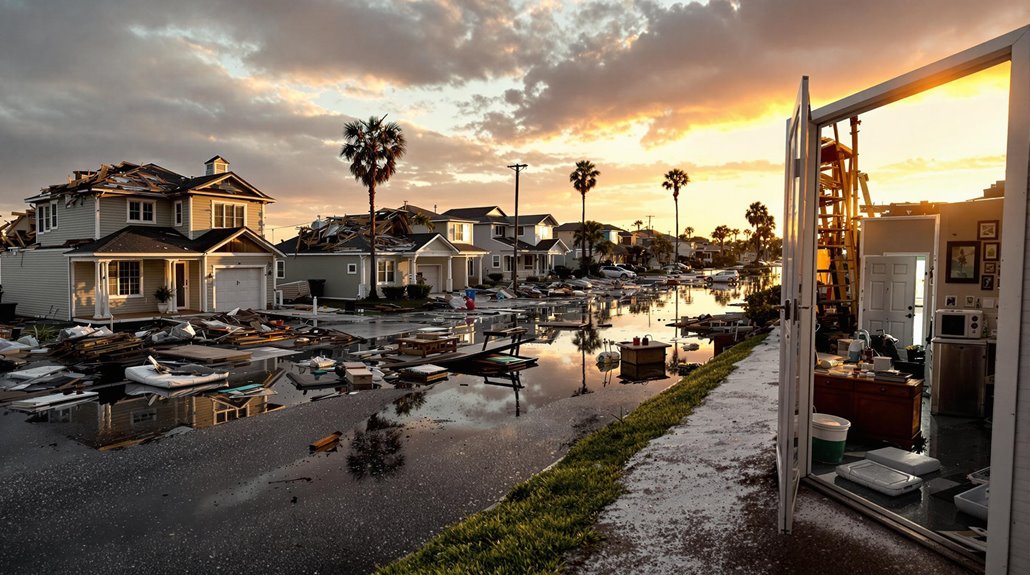
While standard homeowners insurance provides protection against various perils, flood damage requires separate coverage through specialized flood insurance policies. Given that just one inch of water can result in $25,000 worth of damage, understanding flood risk is essential for protecting property investments. The National Flood Insurance Program (NFIP) and private insurers offer coverage options, with insurance premiums varying based on location and risk factors.
| Factor | High-Risk Zones | Low-Risk Zones |
|---|---|---|
| Claims Frequency | More Common | 25% of All Claims |
| Insurance Requirement | Mandatory for Mortgages | Optional |
| Premium Costs | Higher Rates | Lower Rates |
Climate change has intensified flooding risks nationwide, affecting both coastal and inland properties. With federal disaster assistance often proving inadequate, flood insurance serves as a vital financial safeguard. Coverage typically includes protection for both building structure and contents, though policies generally implement a 30-day waiting period before becoming active. Only 27% of homeowners in designated flood zones maintain active flood insurance coverage, leaving many properties vulnerable to devastating losses.
Essential Coverage for Temporary Relocation
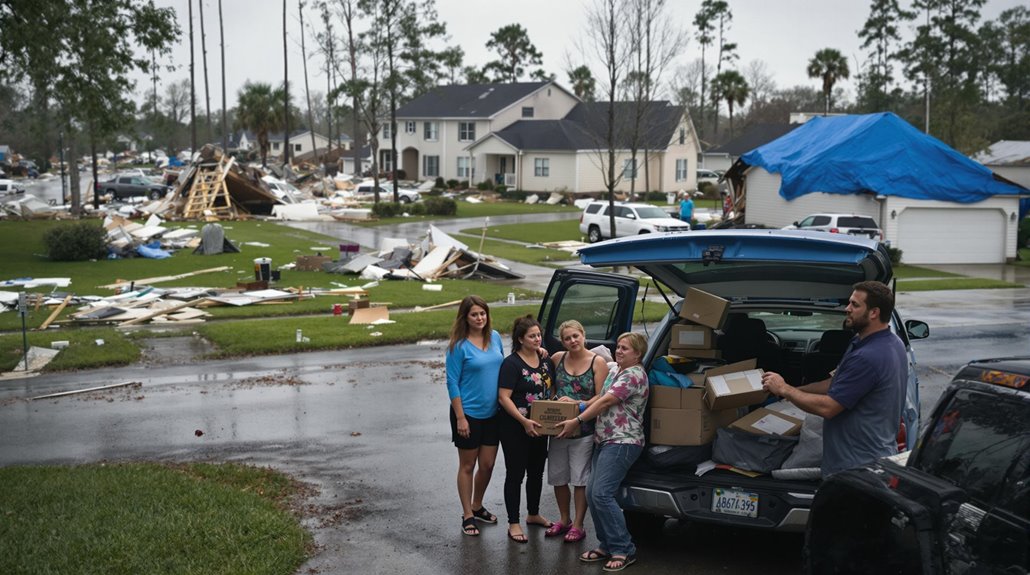
When hurricanes force homeowners to evacuate their damaged properties, Additional Living Expenses (ALE) coverage becomes an important component of insurance protection. This coverage assists policyholders in maintaining their standard of living while their homes undergo repairs, covering costs for temporary housing options, meals, and other necessary living expenses.
Eligibility for ALE benefits depends on specific policy terms and the extent of damage rendering the home uninhabitable. Insurance providers establish criteria for qualifying conditions and may implement separate deductibles or limits for temporary relocation coverage.
Duration of benefits typically aligns with the repair timeline, though policies often specify maximum coverage periods.
Financial assistance programs through ALE coverage operate on a reimbursement basis, requiring detailed documentation of expenses. Policyholders must maintain thorough records of all costs incurred during displacement.
Coverage limits may be structured as daily, weekly, or total maximum amounts, making it vital for homeowners to understand their policy's specific parameters.
Standard policies typically exclude hurricane damage, making additional coverage essential for comprehensive protection.
Filing Hurricane Insurance Claims
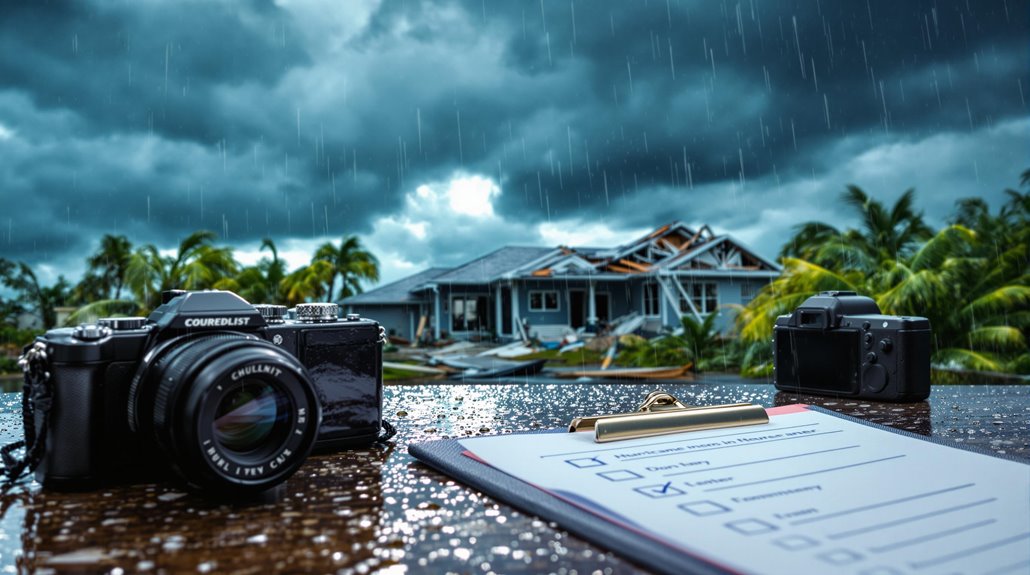
The successful resolution of hurricane insurance claims hinges on methodical preparation and precise documentation before, during, and after storm damage occurs. A thorough documentation checklist includes photographs, videos, detailed inventories of damaged items, and records of all communications with insurance representatives.
When initiating the claim submission process, policyholders must promptly contact their insurance provider and thoroughly understand their policy's hurricane deductibles, which typically exceed standard coverage deductibles. The assigned insurance adjuster will assess the damage and determine coverage based on policy specifications.
Key claim submission tips include maintaining organized records of all transactions, following prescribed filing procedures, and seeking professional assistance when necessary.
If claim denials occur, policyholders may challenge decisions through formal appeals or legal channels. Public adjusters or attorneys can provide valuable expertise in handling complex disputes and negotiating fair compensation, particularly when substantial damage or coverage disputes arise.
Policy review and limits are essential to understand maximum available coverage before filing hurricane damage claims.
Time Limits and Legal Considerations
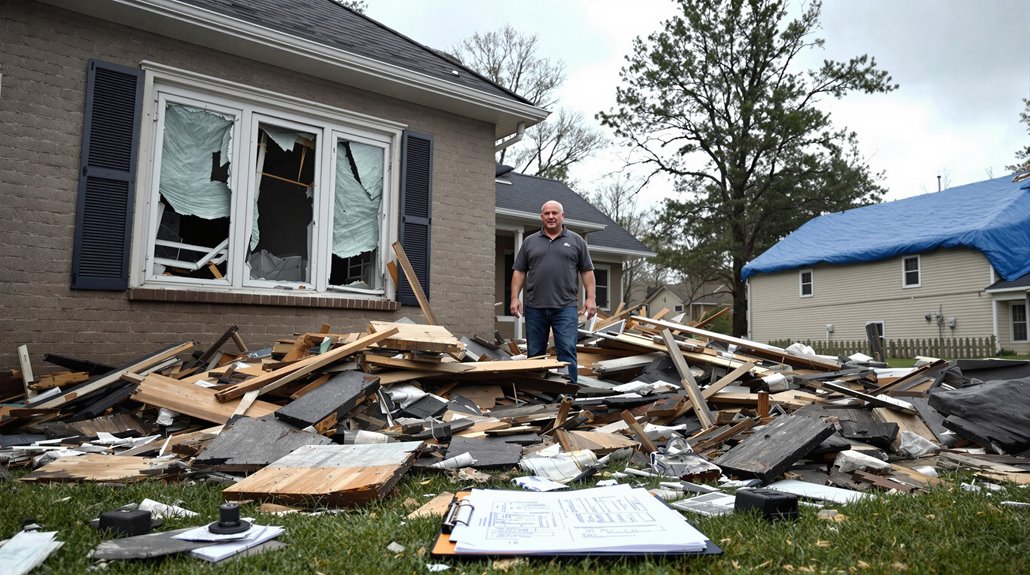
Understanding time limits and legal requirements is vital for hurricane insurance claims, particularly in Texas where strict deadlines and specific regulations govern the claims process.
The state enforces a two-year statute of limitations for filing bad faith property damage lawsuits, while specific claim deadlines vary by insurer and policy terms.
Policyholders must notify carriers within 60 days if claim issues remain unresolved, indicating their intent to pursue legal recourse.
Chapter 542 of the Texas Insurance Code mandates prompt investigation of claims and prohibits bad faith practices, including false denial reasons and misleading policy terms.
Compliance with policy requirements is essential, as policyholders must provide detailed documentation when disputing coverage determinations and consent to property inspection.
Failure to meet these obligations can result in claim dismissal.
Understanding policy limits, exclusions, and state-specific regulations helps avoid coverage disputes and guarantees proper claim handling.
Common Coverage Exclusions

Standard homeowners insurance policies exclude flood damage caused by hurricanes, requiring property owners to obtain separate flood coverage through the National Flood Insurance Program.
Insurance companies apply specific wind damage deductibles for hurricane claims, typically calculated as a percentage of the dwelling coverage limit, such as 2%, 5%, or 10%.
These percentage-based wind deductibles accumulate annually across multiple hurricane events until the full deductible amount is met within a calendar year.
Flood Insurance Required Separately
Despite its critical importance in protecting against water-related disasters, flood insurance remains distinctly separate from standard homeowners insurance policies, requiring property owners to obtain additional coverage through FEMA's National Flood Insurance Program (NFIP) or private carriers.
This separation exists because including flood coverage in standard policies would substantially increase premiums for all homeowners.
Key aspects of flood insurance requirements include:
- Mandatory coverage for homes in designated flood zones
- 30-day waiting period for NFIP policies to take effect
- Coverage limits of $250,000 for structure and $100,000 for contents through NFIP
- Additional coverage options available through private insurers for protection beyond NFIP limits
Property owners should evaluate their flood zone requirements and separate policy options to guarantee adequate protection against flood-related damages, particularly in areas prone to hurricanes or severe storms.
Wind Deductible Percentages Apply
Wind deductibles represent a considerable factor in hurricane coverage, operating differently from traditional fixed-dollar homeowners insurance deductibles. These specialized deductibles typically range from 1 to 5 percent of a home's insured value, though specific percentages vary by state and insurer.
Wind deductible calculations can result in markedly higher out-of-pocket costs compared to standard deductibles. For instance, a deductible comparison analysis shows that a 5 percent wind deductible on a $400,000 policy amounts to $20,000, whereas a traditional fixed deductible might be just $1,000 or $2,000.
Homeowners in high-risk coastal areas should note that named storm events often trigger these percentage-based deductibles. Insurance companies may offer both percentage-based and flat dollar amount options, with policy terms varying considerably by region and provider.
Preparing Your Policy for Hurricane Season

Before hurricane season arrives, homeowners should conduct a thorough review of their insurance policies to guarantee adequate protection against potential storm damage. Policy adjustments may be necessary to ascertain appropriate coverage limits and account for regional variations in hurricane deductibles. Homeowners must also understand specific triggers for these deductibles, which can vary based on storm classification or wind speeds.
Essential preparations include:
- Documenting property contents through photographs and maintaining detailed inventory records
- Securing important documents, including policy numbers and insurance contact information
- Evaluating and reinforcing physical structures, including windows, doors, and gutters
- Stocking emergency supplies and creating evacuation plans
Understanding coverage exclusions is critical, particularly regarding flood damage, which typically requires separate insurance through the National Flood Insurance Program.
Regular policy reviews help guarantee homeowners maintain sufficient coverage for potential repair or rebuilding costs while identifying any gaps in protection that may need addressing.
The Benefits Of Consulting A Public Adjuster
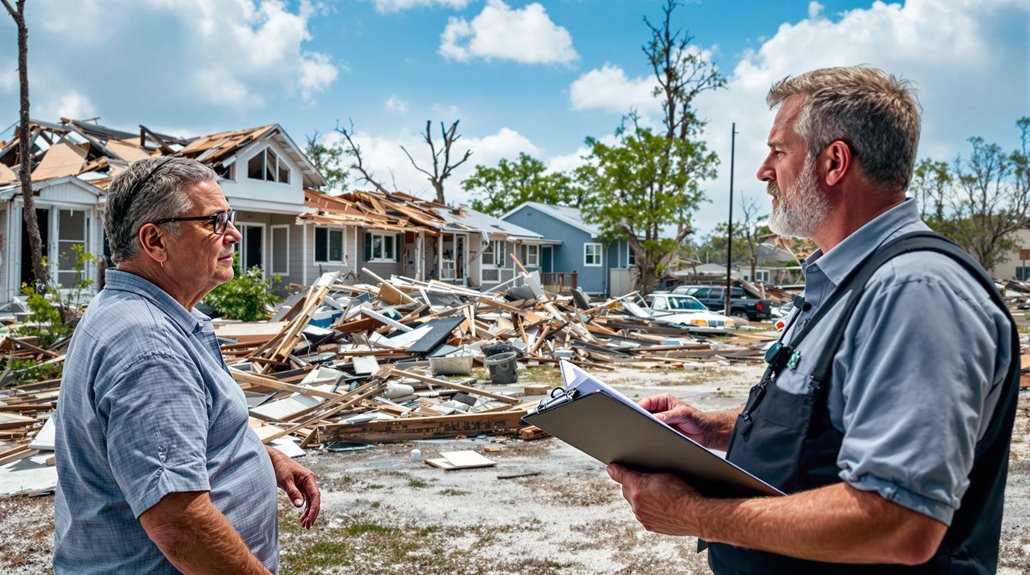
Public adjusters provide professional expertise in managing complex insurance claims, offering objective damage assessments that eliminate emotional bias from the process.
Their specialized knowledge of policy details and industry practices enables a more streamlined approach to filing and negotiating claims with insurance companies.
Statistical data indicates that claims handled by public adjusters typically result in higher settlements, with average payouts exceeding those achieved by homeowners who manage claims independently.
Expertise In Insurance Claims
The expertise of professional insurance adjusters can greatly impact the outcome of hurricane damage claims, offering homeowners a strategic advantage in steering through complex insurance processes. These experts possess a deep understanding of policy specifics and can accurately assess the extent of damages, ensuring that claims are filed correctly and promptly. Homeowners who engage professional adjusters are often better equipped to negotiate with insurance companies, increasing the likelihood of a favorable settlement. To further enhance the claims process, homeowners can also benefit from hurricane damage insurance claims tips that emphasize thorough documentation and proactive communication with insurers.
As expert negotiators, public adjusters possess extensive knowledge of policy language, state regulations, and proper documentation procedures essential for maximizing claim settlements.
- Deep understanding of insurance policy interpretation and enforcement
- Strategic management of complex claims documentation and procedures
- Professional guidance on repair protocols and expense tracking
- Advanced negotiation skills backed by regulatory knowledge
Their professional expertise extends beyond basic insurance claims handling, encompassing intricate aspects of policy enforcement and compliance requirements.
This specialized knowledge allows them to identify coverage opportunities that homeowners might otherwise overlook, leading to more thorough claim settlements and better financial outcomes for property owners affected by hurricane damage.
Objective Damage Assessment
Professional damage assessment conducted by a public adjuster provides homeowners with an unbiased, thorough evaluation of hurricane-related property losses.
These specialists meticulously document all damages, often identifying issues that property owners or insurance company adjusters might overlook, thereby guaranteeing optimal claim accuracy.
Public adjusters work exclusively for policyholders, offering fair representation throughout the claims process.
Their extensive approach includes detailed documentation, evidence compilation, and negotiation with insurance companies to secure appropriate settlements.
By managing paperwork and complex claim procedures, they greatly reduce the burden on property owners while maximizing potential compensation.
Their contingency-based fee structure guarantees their interests align with achieving the best possible outcome for the policyholder, allowing homeowners to focus on recovery rather than maneuvering through complicated insurance processes.
Streamlined Claim Process
Working with a public adjuster greatly streamlines the hurricane damage claims process through systematic management of documentation, communication, and negotiations.
Public adjusters provide extensive homeowner support by efficiently coordinating with insurance companies, contractors, and other involved parties. Operating on a contingency fee basis, they leverage their expertise to maximize claim settlements while reducing stress for property owners.
- Handles all claim documentation and administrative requirements, ensuring thorough and timely submission
- Manages communications between insurance companies, contractors, and homeowners
- Applies extensive knowledge of insurance policies and regulations to optimize settlements
- Provides professional representation throughout the entire claims process, from initial assessment to final resolution
The streamlined approach considerably reduces processing time while delivering superior results through expert negotiation and systematic claim management.
Higher Claim Payouts & Settlements
Statistical evidence consistently demonstrates that engaging a public adjuster for hurricane damage claims leads to considerably higher settlement amounts compared to claims filed independently by homeowners.
Through expert claim negotiation and extensive damage assessments, public adjusters leverage their extensive knowledge of policy language and documentation requirements to secure ideal compensation.
Settlement maximization is achieved through multiple strategies, including detailed documentation of damages, accurate interpretation of policy coverage, and skilled negotiations with insurance companies.
Public adjusters compile thorough claim packages that address all aspects of hurricane damage, ensuring no compensable losses are overlooked.
Their expertise in managing complex claims, combined with their understanding of insurance industry practices, enables them to effectively advocate for policyholders' interests and secure settlements that more accurately reflect the true extent of damages sustained.
About The Public Claims Adjusters Network (PCAN)
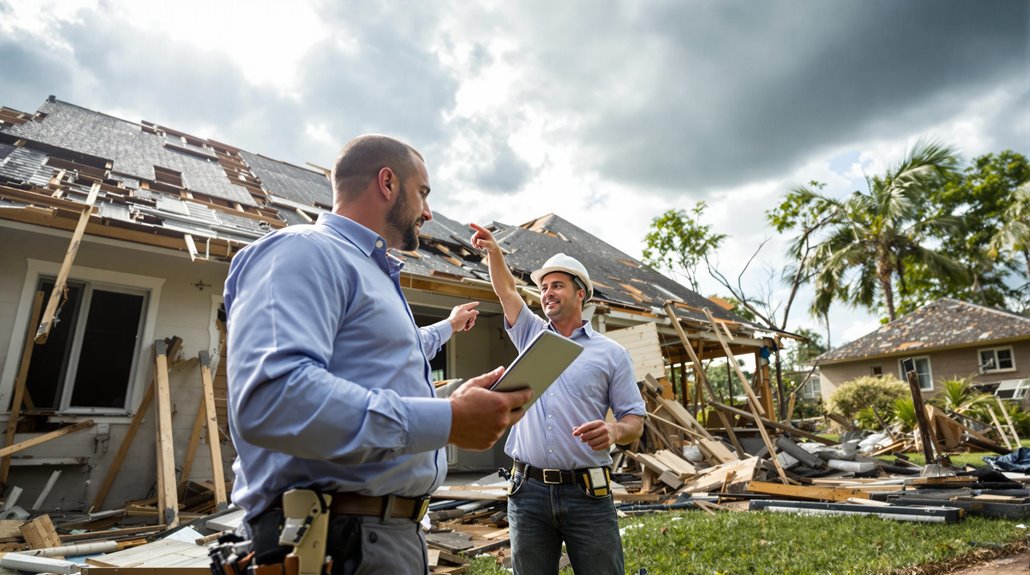
The Public Claims Adjusters Network (PCAN) represents an extensive coalition of licensed insurance claim specialists who advocate for policyholders during property damage claims.
Within the claims adjustment process, PCAN members leverage their professional expertise and nationwide resources to maximize insurance settlements for property owners affected by hurricanes.
- 24/7 emergency response capabilities through an interconnected network of certified adjusters
- Access to specialized contractors, engineers, and industry experts for thorough damage assessment
- Coordinated quality assurance protocols ensuring detailed documentation and claim preparation
- Strategic negotiation support backed by extensive policy interpretation experience
Public adjuster roles within PCAN focus on delivering customized solutions while maintaining the highest professional standards.
The network's members undergo rigorous vetting to verify licensing, certification, and demonstrated expertise in handling complex insurance claims.
Through PCAN's established framework, policyholders receive dedicated representation from adjusters who specialize in hurricane-related damages, ensuring their interests are protected throughout the claims process.
Frequently Asked Questions
Does Homeowners Insurance Cover Damage From Fallen Trees During Hurricanes?
Homeowners insurance typically includes coverage for wind-driven tree damage during hurricanes, including tree removal, subject to policy limits, provided the fallen tree wasn't previously damaged or decaying.
Are Swimming Pools and Outdoor Furniture Protected Against Hurricane Damage?
Standard pool coverage includes hurricane wind damage, but excludes flood-related damage. Outdoor furniture typically falls under personal property coverage, subject to specific policy limits and wind damage provisions.
How Does Previous Hurricane Damage Affect Future Insurance Rates?
Hurricane history greatly influences insurance underwriting decisions, leading to increased premiums, policy adjustments, and potential cancellations as insurers reassess risk exposure based on past damage patterns and frequency of claims.
Can Multiple Hurricanes in One Season Affect My Deductible Requirements?
Multiple hurricanes within a calendar year trigger deductible adjustments, where subsequent storms may qualify for reduced deductibles once the initial hurricane deductible is met during that hurricane season.
Does Insurance Cover Food Spoilage From Hurricane-Related Power Outages?
When darkness falls during hurricanes, standard homeowners insurance typically provides food reimbursement policies for spoilage, covering up to $500 with applicable deductibles when power outage coverage conditions are met.
References
- https://www.allstate.com/resources/home-insurance/insurance-for-hurricane-damage
- https://ldi.la.gov/news/press-releases/11-5-21-commissioner-donelon-updates-2020-hurricane-data-through-sept.-30-2021
- https://ldi.la.gov/news/press-releases/11-3-22-hurricane-ida-data-call-through-september-30
- https://www.kin.com/blog/does-home-insurance-cover-hurricane-damage/
- https://www.assuredpartners.com/news-insights/blogs/personal-insurance/2024/protecting-your-home-and-belongings-from-hurricane-damage/
- https://www.vosslawfirm.com/blog/what-happens-when-there-is-a-wind-exclusion-in-an-insurance-policy-but-the-damage-was-caused-by-.cfm
- https://www.allstate.com/resources/home-insurance/home-insurance-cover-wind-damage
- https://www.smarthomeamerica.org/about-insurance/wind-insurance
- https://www.travelers.com/resources/home/maintenance/homeowners-insurance-for-wind-damage
- https://www.investopedia.com/articles/personal-finance/071114/hurricane-insurance-deductible-fact-sheet.asp



